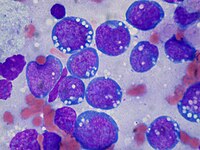
Photo from wikipedia
The X-linked gene DDX3X encodes an RNA helicase that is mutated at high frequencies in several types of human B-cell lymphoma. Females have two active DDX3X alleles and males carry… Click to show full abstract
The X-linked gene DDX3X encodes an RNA helicase that is mutated at high frequencies in several types of human B-cell lymphoma. Females have two active DDX3X alleles and males carry a DDX3Y homolog on the Y chromosome. We show here that pan-hematopoietic, homozygous deletion of Ddx3x in female mice perturbs erythropoiesis, causing early developmental arrest. However, both hemizygous male and heterozygous female embryos develop normally, suggesting that one Ddx3x allele is sufficient for fetal hematopoietic development in females and that the Ddx3y allele can compensate for the loss of Ddx3x in males. In adult mice, DDX3X deficiency altered hematopoietic progenitors, early lymphoid development, marginal zone and germinal center B-cells, and lymphomagenesis in a sex-dependent manner. Loss of both Ddx3x alleles abrogated MYC-driven lymphomagenesis in females, while Ddx3x-deletion in males did not affect the formation of B-cell lymphoma in both mouse models. Moreover, tumors that appeared in male mice lacking DDX3X showed upregulated expression of DDX3Y, indicating a critical requirement for DDX3 activity for lymphomagenesis. These data reveal sex-specific roles of DDX3X in erythro- and lymphopoiesis as well as in MYC-driven lymphomagenesis.
Journal Title: Cancer research
Year Published: 2022
Link to full text (if available)
Share on Social Media: Sign Up to like & get
recommendations!